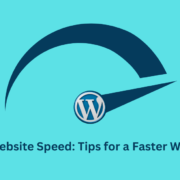Optimizing Website Speed: Tips for a Faster WordPress Site
In today’s fast-paced online world, website speed is crucial in user experience, search engine rankings, and overall website success. If your WordPress site takes too long to open, visitors may abandon it, leading to lost opportunities and decreased conversions. In this blog post, we will explore practical tips and techniques to optimize the speed of your WordPress site, ensuring a faster and more responsive user experience.
Choose a Fast Web Hosting Provider:
Selecting a high-quality web hosting provider is the foundation for a fast-loading WordPress site. Opt for a hosting provider specializing in WordPress hosting, which offers solid-state drives (SSDs) for faster data retrieval and provides scalable resources to handle traffic spikes. Ensure that the hosting infrastructure is optimized for website speed and reliability.

Use a Lightweight and Well-Optimized Theme:
The choice of theme significantly impacts your site’s speed. Opt for lightweight pieces that are designed for performance. Avoid bloated themes with excessive features and complex designs that slow down your site. Look for articles optimized for speed and follow best practices for efficient coding.
Minimize Plugin Usage:
While plugins add functionality to your WordPress site, using too many plugins can impact performance. Assess your installed plugins and deactivate or uninstall any unnecessary ones. Choose lightweight alternatives or seek integrated solutions where a single plugin performs multiple functions. Regularly update your plugins to ensure compatibility and optimized performance.
Enable Caching:
Caching reduces the need for repeated database queries and server processing, resulting in faster page loads. Utilize caching plugins like WP Rocket, W3 Total Cache, or WP Super Cache to generate static HTML files of your pages. These plugins save and serve the files to visitors, reducing server load and improving response times.
Optimize Images:
Images are often the most significant contributors to slow page loading times. Optimize your images before uploading them to your WordPress site. Use image compression plugins like Smush or EWWW Image Optimizer to reduce file sizes without compromising quality. Also, utilize the srcset attribute to serve appropriately sized images based on the visitor’s device.

Minify CSS and JavaScript Files:
Minifying CSS and JavaScript files reduce the size by removing unnecessary spaces, line breaks, and comments. Use plugins like Autoptimize or W3 Total Cache to minify and combine CSS and JavaScript files. This minimizes the number of requests made to the server, resulting in faster page rendering.
Implement Lazy Loading:
Slow loading is a technique that defers the loading of non-visible images and videos until the user scrolls through them. This improves initial page load times by reducing the content loaded upfront. Use plugins like Lazy Load by WP Rocket or a lightweight JavaScript library like lazy Sizes to implement lazy loading on your WordPress site.
Optimize Database:
Regularly optimize your WordPress database to keep it clean and efficient. Use plugins like WP-Optimize or WP Sweep to remove unnecessary data, optimize database tables, and improve overall performance. Regular database optimization ensures faster data retrieval and smoother site operation.
Enable GZIP Compression:
GZIP compression decreases the size of files sent from the server to the visitor’s browser, resulting in faster page loads. Enable GZIP compression by adding the code down below to your website’s .htaccess file:
<IfModule mod_deflate.c>
AddOutputFilterByType DEFLATE text/plain
AddOutputFilterByType DEFLATE text/html
AddOutputFilterByType DEFLATE text/CSS
AddOutputFilterByType DEFLATE text/javascript
AddOutputFilterByType DEFLATE application/javascript
AddOutputFilterByType DEFLATE application/x-javascript
Add
OutputFilterByType DEFLATE application/xml
AddOutputFilterByType DEFLATE application/xhtml+xml
AddOutputFilterByType DEFLATE application/rss+xml
AddOutputFilterByType DEFLATE application/atom_xml
AddOutputFilterByType DEFLATE application/x-font
AddOutputFilterByType DEFLATE application/x-font-TrueType
AddOutputFilterByType DEFLATE application/x-font-ttf
AddOutputFilterByType DEFLATE application/x-font-of
AddOutputFilterByType DEFLATE application/x-font-opentype
AddOutputFilterByType DEFLATE application/vnd.ms-font object
AddOutputFilterByType DEFLATE font/ttf
AddOutputFilterByType DEFLATE font/otf
AddOutputFilterByType DEFLATE font/opentype
</IfModule>

Regularly Monitor and Optimize:
Website optimization is an ongoing process. Regularly monitor your site’s speed using tools like Google PageSpeed Insights or GTmetrix. Identify areas for improvement, perform tests after making changes, and fine-tune your optimizations for better speed and performance.
By implementing these optimization techniques, you can significantly improve the website speed and responsiveness of your WordPress site. Choose a reliable hosting provider, use lightweight themes and plugins, enable caching, optimize images, minify files, implement lazy loading, optimize the database, enable GZIP compression, and regularly monitor and optimize your site. A faster WordPress site enhances user experience, boosts your search engine rankings, and helps achieve your website goals more efficiently.

